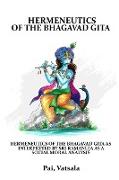- Start
- Hermeneutics of the Bhagavad Gita as Interpreted by Sri Ramanuja as a Social Moral Analysis
Hermeneutics of the Bhagavad Gita as Interpreted by Sri Ramanuja as a Social Moral Analysis
Angebote / Angebote:
Introduction India is proud of having innumerable saints, composers, poets, seers and philosophers, R¿m¿nuja is one among them. An attempt is made to study one of the great works of R¿m¿nuja, The G¿t¿ Bh¿¿ya. The Bhagavad G¿t¿ (The celestial song), one of the Prasth¿na Trayi (The triple text) along with the Brahma-Sutra and the Upani¿ad as a scripture has a universal appeal. The number of commentaries written, traditional and modern, by westerners and Indians is a proof of the same. The G¿t¿ which is a part of the M¿h¿bh¿arata epic is in the form of an advice given by Lord K¿¿¿a to the warrior Arjuna facing a dilemma: whether to fight or not. Seeing his teachers, elders, cousins on the battlefield, he is confused about the futility of fighting a war against his own kith and kin, he thinks that even if he wins the war, the consequences are going to be devastating. This condition of Arjun is known as Vi¿¿dä Yoga. In this situation, Lord K¿¿¿a in the form of Arjuna's charioteer (S¿rathi), counsels him and motivates him to fight, which K¿¿¿a calls a just war, a last resort for the Pandv¿s to claim a fair share of the land which is rightfully theirs.
Folgt in ca. 10 Arbeitstagen
